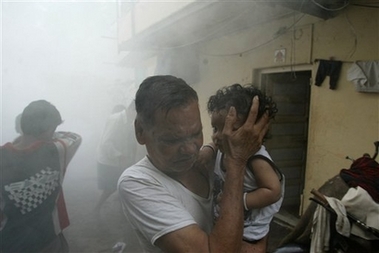Asia-Pacific
India's disease outbreaks stir tourism worries
(Reuters)
Updated: 2006-10-18 15:29
 |
Large Medium Small |
NEW DELHI - India is dealing with scores of of new cases of mosquito-borne diseases each day, as the death toll from an outbreak of dengue fever passed 100, leading to concern about a possible fallout on the tourism sector.
 An unidentified man shields a child from the fumes of a municipality fumigant sprayer as it goes through a residential colony in Mumbai, India, Tuesday, Oct. 17, 2006. Dengue fever cases continued to rise where one more person succumbed to the viral taking the death toll to 36, pushing the country's death toll from the mosquito-borne disease to 103 in seven weeks, a news agency reported Monday. [AP] |
Authorities have reported at least 103 dengue fever deaths and more than 5,700 cases since late August after monsoon rains began to taper off, leaving stagnant and filthy pools of water in many towns and cities.
As officials struggle to cope with dengue cases that have flooded many state-run hospitals, they are also dealing with an outbreak of chikungunya disease which is spread by the female Aedes aegypti mosquito, that also transmits the dengue virus.
India has reported 1.35 million suspected cases of chikungunya with 1,651 confirmed infections in the past seven weeks but no deaths. Both chikungunya and dengue cause high fever, muscular and joint pain, skin rashes and vomiting.
The fact that the number of new cases of both diseases has not let up is worrying tour operators and officials with the peak tourist season starting next month - even though no visitors are believed to have died from dengue.
"If this continues, it will definitely affect tourism in the country," Subhash Goyal, president of Indian Association of Tour Operators, told Reuters on Wednesday.
"We need to clean up our act to ensure tourists are not deterred from travelling to India."